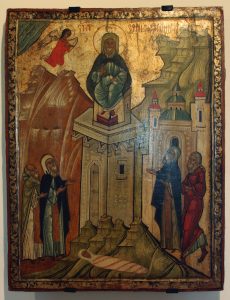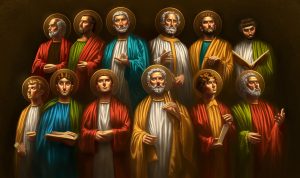Almost every Christian is proud to point how Christianity is so much different than all other religions. If a star was born every time I said it to someone, we’d have another galaxy in the sky!

The main distinct feature of Christianity is, as it is believed, that in other religions people must do things to please God while in Christianity it is God who does everything and salvation is a free gift. You don’t need to do anything, you don’t need to deserve it.

NOW please note this article is not about salvation per se. It only discusses what religion claims – that Christian salvation is a free gift.
TRADITIONAL CHURCHES
In most of traditional Churches – like Roman-catholic, orthodox and some protestant ones – they teach that that salvation is a gift from God but God gives us a lot of aids. Children should be baptized, then depending on denomination – different rites like holy communion, confirmation, confession etc. Plus you need to try to live well, forgive others “so that you’d also be forgiven”. Pray regularly!
And when you die… it’s good to have some friends and family members who will intercede with God or some dead holy people (saints) who have superpowers of hearing lots of praying people at the same time and somehow they will make your chances of salvation better.
Oh, and of course, obey the commandments. Each Church has their own set and none of them have clear rules on how many commandments are important for Christians and how many times can you break them before you’re called lost.

And if you do all these things… then you have a big chance getting to heaven! Just a chance though, never a certainty, because afterall salvation is in God’s hands and He is to speak last about it.
But of course! Salvation is a free gift! By God’s grace!
This is how most Churches believe.
Millions of people try to believe this message. Try, because it’s simply too inconsistent to be believed.
Millions of people live in constant fear of damnation and eternal suffering in hellfire. They are told to love and worship God who is mostly feared, not admired.
It used to be worse though. For most of Christian history it was a common belief was only by total ascetism you can get close to being saved from hell so lots of people were self mutilating, starving themselves and did other terrible things to get this “free gift of salvation”. Look at Symeon the Stylite.

MODERN PROTESTANT CHURCHES
Protestant Churches seem to have less rules than the traditional ones, which doesn’t mean their rules are easier. Number of rules doesn’t determine their difficulty. I could ask you to jump over a tall tree which is just one, straightforward task but you can’t say it’s an easy one. Not unless you live on a planet several times smaller than Earth.
On of the worst rules humans came up with is called Lordship Salvation (LS). Lots of people say it’s an obvious truth, many oppose, but most Christians in fact believe it this way or another. LS says that salvation can be your only when you make Jesus an actual Lord s
LS says that repentance and submission to Christ accompanies saving faith and continuation in the faith and spiritual growth are necessary evidence of saving faith. If you don’t grow, if you have habitual sin in your life and do nothing about – then your faith is futile, you probably never really believed.
Why won’t you try to find LS in the Bible though? Good luck. If LS was a real doctrine the Apostle Paul would have to warn Corinthians, that they were going straight to hell. Corinthians were going to prostitutes, committed incest and idolatry, got drunk in churches and so on. Yet Paul calls them God’s sacred temple, God’s field (1 Cor 3), he says they are all the Lord’s people who will judge the angels… There’s no word of warning, “Behave or you will burn”.
If the devil was to make doctrines, I’m pretty sure he would author LS. LS makes Christians live in constant fear, as you never know if today you won’t happen to commit something that will question your status.

Most of LS believers I met actually were saying boldly that their lives are free of habitual sin… this usually ended our conversation as I was scared to stain them with my sinful presence 😺
LS will make everyone bitter, anxious and focused on their performance, constantly comparing themselves to others thinking if they’re not better, if their behavior isn’t better evidence than hours that they are saved, not us.
LS believers will deny that they works are necessary for salvation, they say that faith simply changes the convert’s life and the works are just a mere result. There is one problem though. Virtually everyone has a different definition of a changed life. If someone stops drinking heavily but still smokes and curses… is his life changed? If someone cheats on their spouse a few times a week but after becoming Christian does it just a few times a year… wow the change is huge, isn’t? Qualified for heaven?
I had very short periods of life when I was close to believe LS was real, but most of my Christian life I couldn’t fathom how irrationally judgmental you must be to be able to determine whose life is an evidence of being saved and whose isn’t.

I, for example, for almost all of my Christian life smoked cigarettes and shortly speaking – Polish Baptists don’t smoke – it is regarded as a a very fleshy thing and even though Baptists officially reject LS, when they see someone “sinning” openly they may wonder out loud “are they even saved?”
I tried to talk to some fellow Christians, how can they think smoking is such a bad thing and everyone says it’s such a carnal thing while most of Christians don’t see anything wrong about making clicks at church, taking crap about people behind their backs or wasting 6 hours a day to watch shows.
They just looked at me weirdly.
To avoid judgment and being gossiped about I smoked in secret.
Many Christian denominations introduced other… conditions of unconditional salvation 🙂 Baptism, speaking in tongues, abstinence from alcohol or other drugs… the list is long.
Yet they all call it free salvation…
While both Catholic and Protestant option to me seem as free as the paycheck I get from my employer.
Let’s sum it up before I get to something I find actually to be most important.
Virtually all Christian Churches preach a totally illogical theology of “free salvation” where you actually need to work really hard, still never being certain if one is successful. Speaking of free salvation is nonsense as long as there are conditions to it!
If I say “move your finger and you’ll get a million bucks”, however strange it sounds, the million dollars won’t be free. It will be wages. Big without proportion, yet wages.
If Churches wanted to be consistent, they should either stop calling salvation free or get rid of all conditions of it.
But this was not all that hilarious comparing to what I am about to say…
There is one more condition… of free salvation…
FAITH
How could I not see this weird for so many years that you can’t claim you need to “believe to be saved” and still call salvation free!!!
One of the fundamental Christian doctrines lacks logic and no one cares?
When I started questioning things and asking my fellow believers uncomfortable questions I was often told that just because I don’t understand something doesn’t mean it’s not true… that God’s ways are higher than hours… that “God chose the foolish things of the world to shame the wise” (1 Cor 1:27a) but if this is supposed to mean “no logic in dogmas”, why even bother formulate them?
With time I came to a firm statement:
God isn’t offended when we ask questions.
If he could take offense at us (I don’t think he could), he would – for not using the brain he gave us.
If your church talks about free gift of salvation but adds conditions to it, even as “small” as faith, their dogmas have contradictions.
And if your church contradicts itself with main, crucial doctrines… what makes you think it doesn’t with all the others?
And by the way… “small” as faith? “SMALL”? Having someone believe that God came to Earth 2,000 years ago, looked as a human being, made thousands of bread loaves from a few, raised the death and got back to life after being crucified… this all is not a small thing.

The biblical word of Gospel is euangelion – literally “good news”. Bible writers and their original readers had no problem understanding this, no one questions it anywhere. This news is supposed to bring you peace. If it doesn’t, it means you don’t read what’s written. You read into it the ideas what religion wants you to think.
And the goal of religion is to control you.

Ask any dictator. Can you control without causing fear? Of course not.
Last, but not least… if salvation is free, then all people will be saved, right?
No?? Then it’s not free.

Read the Bible again, my friend! No one worries there about their fate after death, neither should you!
Let the peace of Christ rule in your hearts, since as members of one body you were called to peace. (Colossians 3:15a)
Today: 8 Total: 246153


















